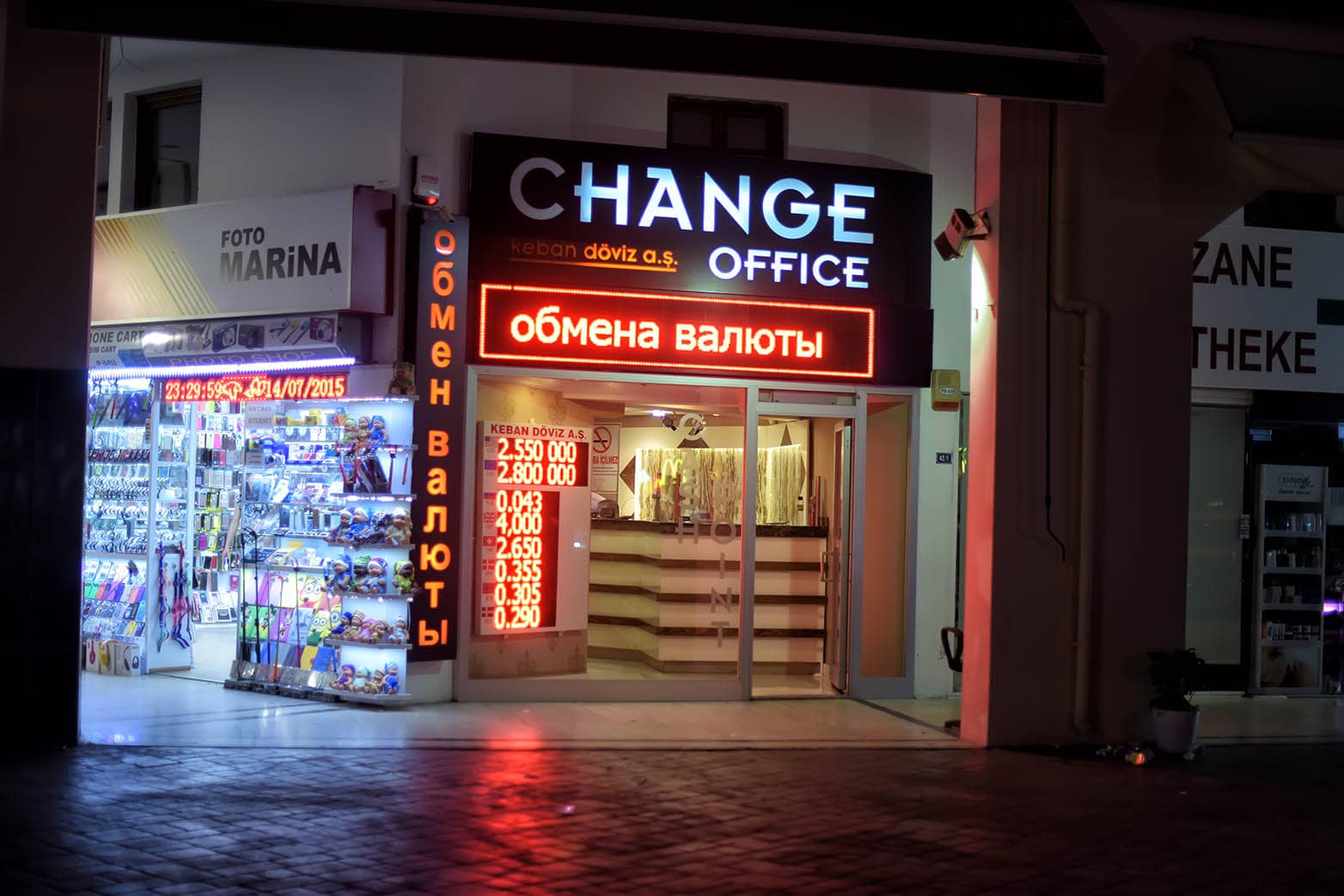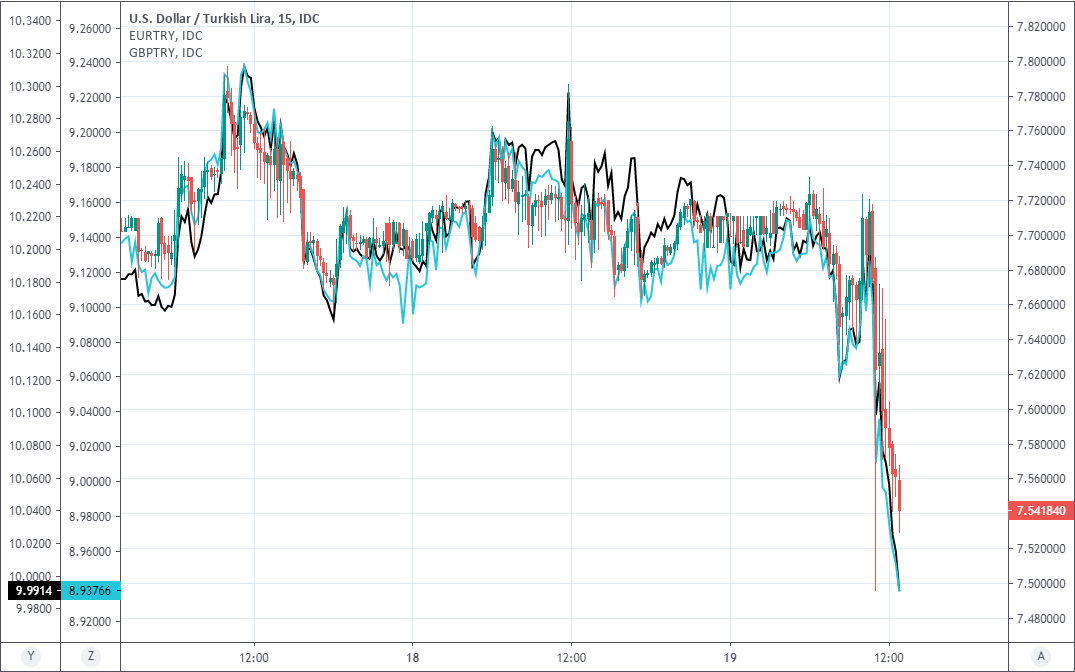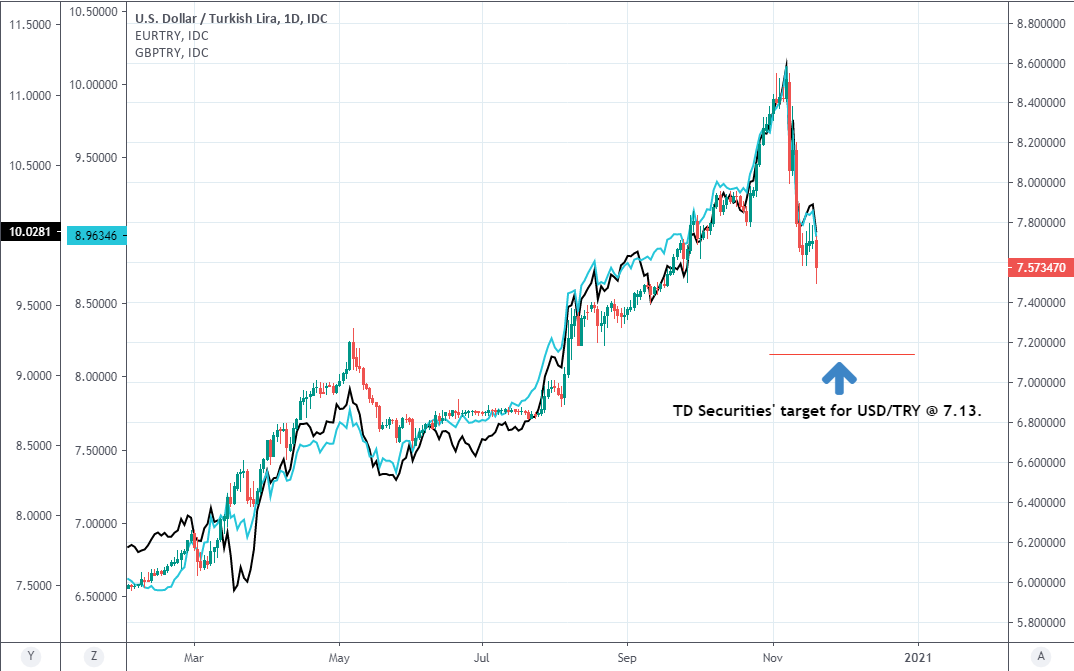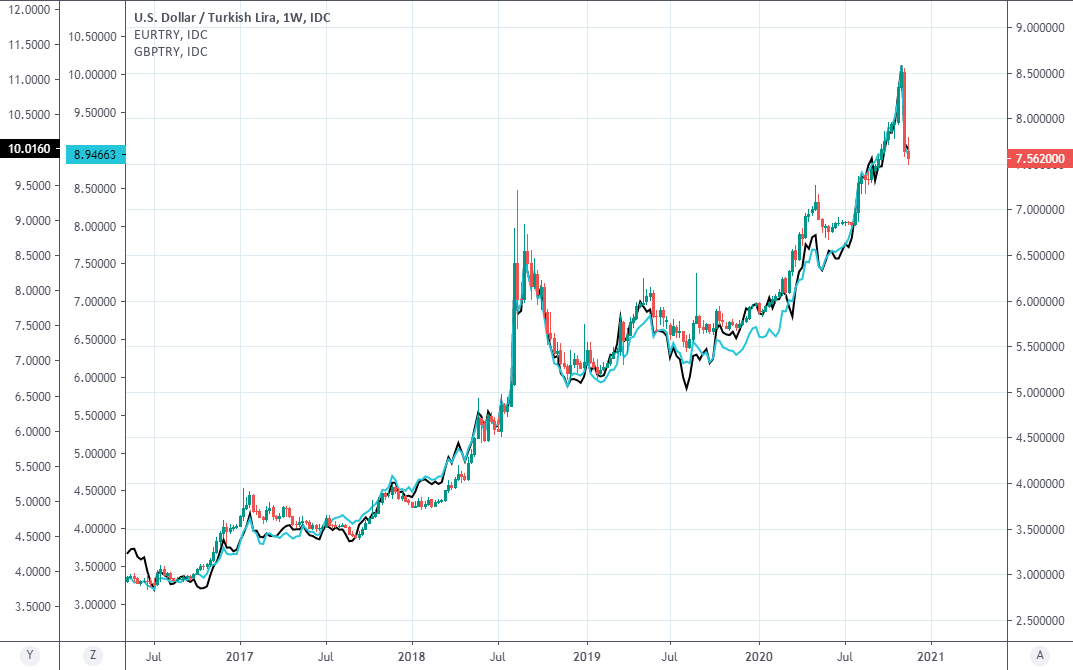Turkish Lira Seen Reversing 2020 Summer Sell-off after TCMB Turnaround on Interest Rate Policy
- Written by: James Skinner

Image © Adobe Images
- GBP/TRY spot rate at time of writing: 10.01
- Bank transfer rate (indicative guide): 9.66-9.73
- FX specialist providers (indicative guide): 9.86-9.92
- More information on FX specialist rates here
The Lira leapt higher against the Dollar, Pound and Euro on Thursday after the Central Bank of the Republic of Turkey (CBRT, TCMB) raised interest rates and announced a landmark shift in how it sets policy, placing the Turkish currency on course to reverse its summer sell-off, according to some analysts.
Turkish policymakers lifted their main interest rate by +475 basis points from 10.25% to 15%, matching market expectations for a substantial increase in the cash rate which partially reverses the steep cuts that took it down from 24% in July 2019 to a low of 8.25% before September 2020's increase.
The move was signalled in advance by a changing of the guard that saw CBRT Governor Murat Uysal replaced by former finance minister Naci Agbal just as the finance ministry also changed hands, with President Recep Tayyip Erdogan's son-in-law Berat Albayrak replaced by former development minister Lufti Elvan.
"The lagged effects of depreciation in Turkish lira, increasing international food prices and deterioration in inflation expectations affect the inflation outlook adversely," the CBRT says in its interest rate statement. "Accordingly, the Committee has decided to implement a transparent and strong monetary tightening in order to eliminate risks to the inflation outlook, contain inflation expectations and restore the disinflation process."
Musical chairs in public institutions and Thursday's rate rise have brought to at least a temporary end the depreciation of the Lira that was sparked when the policy actions of the CBRT led markets to believe President Erdogan was having an undue influence on the calibration of Turkish interest rates.
Above: USD/TRY, EUR/TRY (blue) and GBP/TRY (black) shown at 15-minute intervals.
Erdogan has long argued that high rates lead to high inflation and vice versa while seemingly demanding steep reductions in borrowing costs that have driven 'real interest rates' below zero, prompted a collapse of the Lira that has drained the country's foreign exchange reserves and lifted inflation.
"In the periods ahead, all factors affecting inflation will be taken into account, and the tightness of monetary policy will be decisively sustained until a permanent fall in inflation is achieved," the CBRT said in its statement on Thursday, before also announcing that it will now only seek to influence monetary conditions using its main cash rate.
The conventional thinking on the subject of rates is that lower rates lead to higher inflation and vice versa, which is part of why the Turkish Lira reacted negatively to the programme of rate cuts while lower borrowing costs may also have played a role in lifting Turkish inflation.
However, the Lira's collapse has also played a significant role in fomenting inflation pressures while the central bank had been using other interest rates asides from its main benchmark in order to covertly lift borrowing costs for months. So much so that some analysts say Thursday's actual increase in the weighted-average-cost-of-funding for Turkish borrowers was just 0.2% and that it's the CBRT's commitment to pursue its inflation objectives in a more orthodox manner that matters most for the Lira.
"This is all positive for the lira. It supports further downside extensions of USDTRY. However, as the effective tightening of the WACF is only 20bps today, the CBRT may have to deliver more in the coming months to keep TRY on an appreciation trajectory," says Cristian Maggio, head of emerging market strategy at TD Securities. "But until then, the CBRT may have gotten the upper hand. USDTRY may continue to edged lower for now."
Above: USD/TRY, EUR/TRY (blue) and GBP/TRY (black) shown at daily intervals with TD Securities' target.
Maggio says that until Thursday no money was loaned to Turkish banks at the 10.25% cash rate and that instead the CBRT had imposed a covert form of tightening on the economy using the late liquidity window (LLW) and overnight lending rate (o/n), which were 13.25% and 14.75% respectively.
This means the actual increase in borrowing costs for Turks is much less than that implied by the scale of Thursday's rate hike, but the Lira has been burnished by the shift to a more transparent and orthodox form of policy where interest rates rise in response to inflation and the one-week repurchase rate (cash rate of now-15%) is primary lever.
"The Central Bank will attain its main objective of achieving and maintaining price stability by adopting transparency, predictability and accountability principles of the inflation targeting regime. In light of these principles, the Central Bank funding will be provided through the one-week repo rate, which will be the main policy tool and the only indicator for the monetary stance," the CBRT now says. "The permanent establishment of a low inflation environment will affect macroeconomic and financial stability positively through the fall in country risk premium, reversal in the dollarization trend, accumulation of foreign exchange reserves and the perpetual decline in financing costs."
{wbamp-hide start}{wbamp-hide end}{wbamp-show start}{wbamp-show end}
Such a shift means an end to the often relentless pressure on the Lira for as long as the new orthodoxy can last, which is likely to push USD/TRY down to 7.13 according to TD Securities' Maggio, who's advocated that clients bet on that outcome over the short-term.
This would see the Lira reverse its summer sell-off against the Dollar, Euro and Pound because a 7.13 USD/TRY rate would imply a EUR/TRY that falls from 8.95 to 8.44 in the event that EUR/USD remains around Thursday's 1.1840. Such a USD/TRY outcome implies a GBP/TRY rate that falls from 10.00 to 9.48 if GBP/USD holds around 1.33.
However, declines in EUR/TRY and GBP/TRY would be even larger if Sterling and the Euro cede further ground to a U.S. Dollar that was resurgent again on Thursday due to the spread of coronavirus in Europe and North America, and resulting measures that governments are using to contain it.
Above: USD/TRY, EUR/TRY (blue) and GBP/TRY (black) shown at weekly intervals.
"We are of the opinion that a major top has been formed," says Axel Rudolph, a senior technical analyst at Commerzbank in a Monday note. "USD/TRY formed a major top at its recent all-time high at 8.5814 (according to CQG data) before swiftly coming off towards the late September low and the 2020 uptrend line at 7.4945/4639. In this area the cross is likely to short-term stabilise. Further minor support comes in at the 7.4193 August high and also between the 7.2692 May high and the 7.2081 August 21 low."
Analysts may diverge over the anticipated scale of a likely continued rebound by the Lira, but most agree the purported shift in policy at the CBRT is balm for a battered and bruised currency that had fallen by -140% against the Dollar between January 2018 and November 2020.
But risks remain and not least of all because Turkey's leader President Erdogan has seemingly influenced the central bank in the past and continues to vent against high interest rates. Some of Erdogan's remarks made last week had led markets to believe that a change of approach was afoot, while other complaints went overlooked.
Erdogan was quoted saying on Wednesday that investors should not be left to "get crushed under high interest [rates]," while he said in a statement the previous week that “We are now waging a struggle of historic importance against those who seek to yet again condemn Turkey to modern-day capitulations through the shackles of interest rates, exchange rates and inflation" when celebrating the memory of Ghazi Mustafa Kemal Atatürk, founder of the Turkish republic.
"We would go with TRY optimism now, but remain more circumspect in the medium-term," says Galvin Chia, an emerging market strategist at Natwest Markets in a note to clients last week. "While recent statements and speeches show initial momentum towards market-friendly policy, committing to and delivering on policy to bring down inflation and address external imbalances in the medium term is the second, and more difficult, policy test. We believe that President Erdogan remains a key player in the direction of monetary policy settings, making the political economy an important input."







